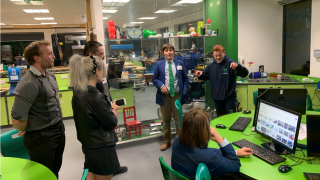
Qimtek recently met with the Formula 24 team at Kew House School to discuss the performance of their race car.
Formula 24 is a programme that aims to inspire 11-16 year olds in STEM subjects, by supplying electric kit cars to be built and raced against other participating teams. Kew House School’s own involvement in Formula 24 spans a number of years, with Qimtek acting as one of their sponsors; subsequently, we’ve followed their progress closely and have previously asked for our members’ assistance within the project.
The Kew House School team explained to us that the main components of the Formula 24 kit are the motor and the batteries, with other parts - including the chassis - to be manufactured independently and in accordance with the team’s own vision. Their last race saw them travel 28.1km with a minimum of 28.9km needed to qualify, meaning that the team are now looking to make modifications to their existing design.

READ: Formula 24 Autumn Update
Proposed Modifications:
Some of the team’s considerations include the gearing ratio of the car and its effect on the efficiency, as well as ‘training’ the battery to increase its charge. The car has also run into problems when handling the tighter bends of the racetrack circuit, causing the tyres to bald at an exponential rate. However, the team’s priority is obtaining a carbon fibre chassis to decrease the weight of the car and provide a streamlined profile - a stark contrast to the heavy steel and aluminium body that is currently being used.
Rather than top speed, Formula 24 is judged upon the maximum distance travelled in a single battery charge.
The students explained that a carbon fibre body would also help to reduce drag, as they would be able to enclose the wheel connectors and steering mechanisms that are currently exposed. A redesigned chassis could also be extended to cover the car’s driver, increasing safety as well as improving the aerodynamics and performance of the car.
In addition to the weight of the chassis, another challenge facing the team is their car’s battery life. Rather than top speed, Formula 24 is judged upon the maximum distance travelled in a single battery charge, with 90 minutes being the maximum time limit. Although each team must take three pit stops per race, the battery cannot be changed during the race itself; instead, these are changed in between races to comply with the rules.
This has left the Kew House Formula 24 team with a number of considerations to improve battery life. Firstly, a switch from lead acid to lithium ion batteries is being explored, while the team are also looking at ways of reducing the resistance of the motor. Formula 24 cars are allowed no more than two batteries; the Kew House team are keen to run their braking and telecommunications systems off of a single battery to aid performance.
Kew House School’s Formula 24 team are excited about the future of the project, with a number of new members having recently joined. In addition, the team is considering the possibility of hiring a velodrome to test the car prior to the next race.

READ: Formula 24 - Bridging the Skills Gap
Help Needed!
The importance of programmes such as Formula 24 cannot be understated at a time where the skills gap has reached a critical level.
The importance of programmes such as Formula 24 cannot be understated at a time where the skills gap has reached a critical level. It is vital to the survival of the UK’s manufacturing industry that we encourage younger generations to consider STEM careers.
Through practical, hands-on learning, children can discover the different applications of engineering, while also developing their skills within a task that captivates their interest. However, it’s not possible for Kew House School’s Formula 24 team to complete all aspects of the manufacturing processes involved, which is why we’re keen to speak to companies who can offer their assistance.
Specifically, the team are looking for an external supply who can assist with the manufacture of the proposed carbon fibre body. Unfortunately, previous attempts to source such a design have proven unsuccessful, drastically hindering the team’s chances of qualifying in future races.
If you would like to get involved with Kew House School’s Formula 24 project, whether it’s to offer manufacturing and engineering assistance or simply advice, please call Karl Wigart on 01256 394 500.
